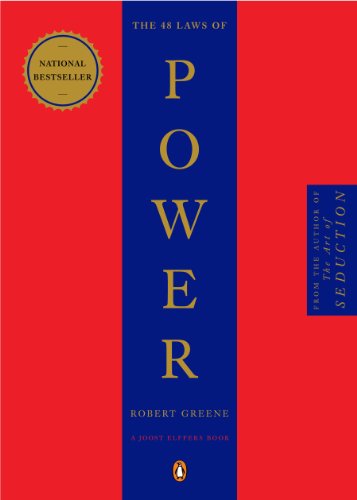

This article is an excerpt from the Shortform summary of "The 48 Laws of Power" by Robert Greene. Shortform has the world's best summaries of books you should be reading.
Like this article? Sign up for a free trial here .
Overview of Law #46: Never Appear Too Perfect
Your talents and achievements will generate envy. The envious will work quietly against you. To forestall or mitigate envy, admit to a flaw or weakness, emphasize the role of luck, or downplay your talents. Envy is extremely dangerous — recognize it and don’t let it escalate. This is why you should never appear too perfect.
Principles of Law 46
Your success will arouse the envy of those around you, and can bring harm upon you, if you don’t recognize the signs and stop it before it grows into a destructive force.
With little exception, your talent, accomplishment, and public admiration will generate unease in others. The reason is that most people have an inflated sense of self-worth. Your success punctures their balloon — they’re not as talented or as smart as they thought. They may even be mediocre. This stirs up envy and feelings of inferiority. This is why it’s important to never appear too perfect.
People may disguise their envy by criticizing you (for instance by saying you got where you are by taking advantage of others), or they’ll praise you excessively. Others will be indirect, working quietly and persistently to undermine you. Signs of envy include sarcastic remarks or open expressionf of resentment.
According to Law 46 of the 48 Laws of Power, the people you should fear the most are those close to you — the family, friends, peers, and acquaintances you’ve outshone.
Although you may not recognize that someone’s jealousy is building, you’ll eventually feel the brunt of it — unless you learn to prevent or de-escalate it.
Often your obliviousness and your own actions will stir up envy. By being aware of your actions and tendencies, you can mitigate it.
Here are two of the ways people help create envy and appear too perfect:
- When something good happens to them, they trumpet it. They enjoy making others feel inferior
- Those with great natural talent show it off; rather than charming people, it makes them hate you. It’s wiser to downplay your outstanding qualities, by acknowledging a small flaw or weakness.
It’s better to avoid creating envy in the first place. Following are some pitfalls to watch for and ways to never appear too perfect:
- When you’re the beneficiary of something that seems to come out of nowhere, downplay your merit and emphasize the role of luck. However, don’t express a false sincerity that others can see through — you don’t gain anything by alienating your peers; you need them as part of your power base.
- Attaining political power creates envy. Mitigate it by seeming to be unambitious, or make your position seem less attractive by emphasizing the sacrifices it requires.
- Avoid the urge to help or do favors for those who envy you — it will come across as condescending.
- Be aware that colleagues and peers, accustomed to a semblance of equality, are especially susceptible to envy.
Finally, you may feel envy yourself for more successful people. This will cause you to act emotionally and think less logically. To counter this, accept that others will surpass your achievements and talent, and that you’ll envy them to some degree. Use that feeling to push yourself harder to surpass them or reach your own goals.
Putting Law 46 to Work
Here are some examples of how to apply and how NOT to apply Law 46 of the 48 Laws of Power:
- The painter J.M.W. Turner’s great skill with color generated envy among fellow artists, to the point that some wouldn’t allow their paintings to be hung next to his in galleries, because they looked bad by comparison. Turner realized he’d soon have difficulty finding places to show his work, so he temporarily toned down some of his colors using soot.
- To avoid stirring up envy, George Washington at first refused high positions that were offered: Commander in Chief of the American army, and the presidency. By doing so, he increased his popularity.
- Sir Walter Raleigh eventually was executed, in part due to the jealousy he constantly inspired and made no attempt to mitigate. He was one of the most brilliant men of his time — a sea captain, writer, entrepreneur, scientist, and a charming, attractive courtier under Queen Elizabeth — but failed to recognize his many implacable enemies. He appeared too perfect.
- In the 1950s, the writers and lovers Joe Orton and Kenneth Halliwell started their careers together, but while Orton achieved success and acclaim for his plays, Halliwell failed. Orton tried to boost his friend’s career but ended up insulting him. Halliwell seethed for years, and finally ended up murdering Orton and then taking his own life.
Exceptions to Law 46
Are there any exceptions to Law 46 of the 48 Laws of Power? Should you ever appear perfect? When you’re in a position of power, and you can’t do anything to mitigate someone’s envy, be aggressive. Show disdain for those who envy you. Instead of hiding your accomplishments, display them. Your opponent’s self-imposed torment will be your revenge. But, in general, follow Law 46 of the 48 Laws of Power: Never Appear Too Perfect.
———End of Preview———

Like what you just read? Read the rest of the world's best summary of "The 48 Laws of Power" at Shortform . Learn the book's critical concepts in 20 minutes or less .
Here's what you'll find in our full The 48 Laws of Power summary :
- Why you should never outshine your boss
- How to appear like a friend but behave like a spy
- The 6 rules you absolutely must not violate, if you want to be successful






